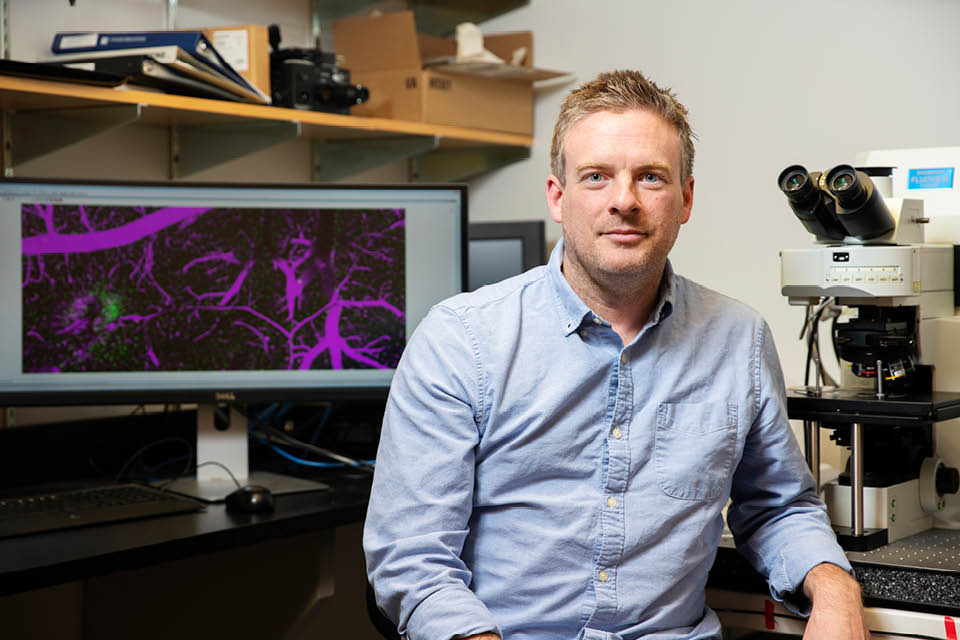Understanding the aging brain
- Jessica Skelton

Researchers investigate new approaches to slow loss of brain power
Aging is usually associated with weakened mental abilities. Before identifying effective solutions to this decline, we need to understand the reason our brains slow down in the first place.
Neurobiologist Craig Brown and the students in his laboratory at the University of Victoria’s Division of Medical Sciences have been investigating possible causes for this drop in mental power. Turns out, the answer could reside in the brain’s circulatory system.
The brain contains kilometres of small blood vessels called capillaries, which deliver the nutrients and oxygen critical for proper brain function. While scientists already knew we lose some of these vessels as we age, it wasn’t until this year that Brown and graduate student Ben Schager found that these losses are more likely to occur in certain brain regions: white matter, the hippocampus and sensory-motor related grey matter.
White matter plays an important role in connecting different areas of the brain, while the other areas play critical roles in learning and memory, attention, movement, sensory information processing and more. It’s possible blood vessel loss in these specific brain regions is the reason these cognitive functions degrade over time, causing a lot of the behaviours associated with aging, dementia and Alzheimer’s.
Now that Brown and his team have an idea of what may cause mental decline, it’s possible to narrow the search for solutions that slow the process down. Specifically, researchers can focus on how to keep the brain’s circulatory system healthy by stopping or slowing capillary loss.
If your circulatory system in your brain is not working and not distributing oxygen and nutrients properly, how do you expect your brain to function properly?
—asks Neurobiologist Craig Brown of UVic's Division of Medical Sciences
His team thinks there may be truth in the old adage “healthy body, healthy mind.”
“A healthy body usually means a healthy brain,” reiterates Brown. “A direct connection between them is the circulatory system. It’s not like the circulatory system stops at the neck.”
One of the reasons we lose vessels in the brain is because they experience routine clogs, or stalls, caused by cells and other debris in the blood. While obstruction and pruning of brain capillaries is normal, Schager found the brain regions most prone to vessel loss are those more prone to clogging.
Schager also found that physical exercise and mental stimulation like learning and social interaction lowers the number of stalls, promoting better blood flow throughout the brain. A healthy lifestyle can help manage diabetes, a vascular disease that postdoctoral fellow Sorabh Sharma found can increase the risk of capillaries clogging. Brown says it’s likely other conditions associated with an unhealthy lifestyle—obesity, high cholesterol, smoking, etc.—could increase the number of clogs too.
Sharma is also currently trying to understand if it’s possible to clear capillaries that are already blocked.
While we can’t stop aging, it could be possible to delay some of its mental symptoms and minimize the effects of Alzheimer’s and dementia. With a better understanding of what causes the decline in brain power, researchers in Brown’s lab and elsewhere can focus their research on keeping the brain’s circulatory system clear and healthy. And the first solution may be simply taking care of your body.
EdgeWise
In 2018, Brown and PhD student Patrick Reeson found that about 30 per cent of blocked capillaries in a healthy brain are pruned from the brain's circulatory system and never replaced.
Reeson and Brown also found that a vascular growth factor receptor, VEGF-R2, played a crucial role in dictating whether a capillary regained blood flow or became permanently clogged and was pruned. VEGF-R2 is an important protein in the formation of the human circulatory system and regulates the function of blood vessels. Further research into the protein’s role in the pruning process will deepen knowledge and inform future treatment approaches, says Reeson.
Meanwhile, Schager found vessel losses are concentrated in specific areas of the brain. White matter is the most susceptible, with a healthy brain losing about a quarter of the blood vessels in this region.
The Brown lab research is funded by the Canadian Institutes of Health Research, Heart and Stroke Foundation Canada, Natural Sciences and Engineering Research Council of Canada, Canadian Foundation for Innovation and the Michael Smith Foundation for Health Research.
Photos
In this story
Keywords: knowledge, research, health, medical science
People: Craig Brown
Publication: knowlEDGE





